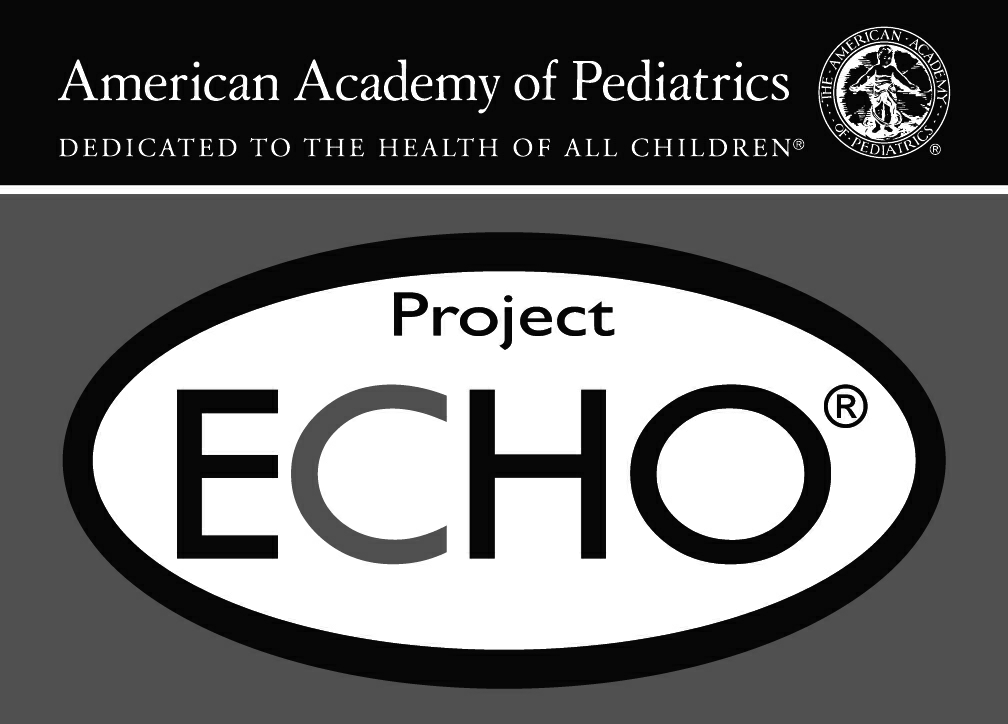0920-1154 Pediatrician - ECHO Program Satisfaction Survey
CDC/ATSDR Formative Research and Tool Development
ATTACH A3_AAP Neurodevelopment ECHOProgram Satisfaction Survey_OMB_June 2020 Response_clean copy
American Academy of Pediatrics Neurodevelopmental (ECHO)
OMB: 0920-1154
F OMB No. 0920-1154 Exp. Date 1/31/2023
|
AAP Neurodevelopment ECHO Post-Program Survey |
|
Thank you for participating in an evaluation of the AAP Neurodevelopment ECHO program. This program is supported by the Cooperative Agreement Number, NU38OT000282, funded by the Centers for Disease Control and Prevention. Its contents are solely the responsibility of the authors and do not necessarily represent the official views of the American Academy of Pediatrics, Centers for Disease Control and Prevention or the Department of Health and Human Services.
To understand how well this program met the needs of learners and achieved the objectives of increasing participant knowledge and confidence to appropriately identify and care for children with neurodevelopmental delays, we ask you to complete the following survey.
All data collected is confidential and will not be associated with your name or place of work. Data will be stored on password protected computers and responses will be combined with other participants' responses and will be reported in aggregate for dissemination. Your name or any other identifying information will not be disclosed through reports, publications or presentations related to this TeleECHO program.
This program has been reviewed and approved by the AAP Institutional Review Board (IRB). The risks involved with completing this survey are no greater than the risks a person may find in their daily life. You do not have to answer any question that you do not wish to answer, and you may stop completing the survey at any time.
If you have any questions, please contact AAP Program Manager Shannon Limjuco at (630) 626- 6217 or [email protected]. Thank you for your time and commitment to the AAP Neurodevelopment ECHO program! * 1. To take the survey, please select NEXT. To end this survey, please select END.
Public reporting burden of this collection of information is estimated to average 10 minutes per response, including the time for reviewing instructions, searching existing data sources, gathering and maintaining the data needed, and completing and reviewing the collection of information. An agency may not conduct or sponsor, and a person is not required to respond to a collection of information unless it displays a currently valid OMB control number. Send comments regarding this burden estimate or any other aspect of this collection of information, including suggestions for reducing this burden to - CDC/ATSDR Reports Clearance Officer; 1600 Clifton Road NE, MS D-74, Atlanta, Georgia 30333 ATTN: PRA (0920-1154).
|
|
AAP Neurodevelopment ECHO Post-Program Survey |
|
|

* 6. Which of the following best describes your professional position?
* 7. Which of the following best describes your primary practice setting?
* 8. Please indicate your practice/organization's location:
|


9.
What percentage (%) of your patient population would be
considered underserved? 10.
Please indicate the number of years in practice/profession: 11.
Please estimate the number of children and youth that you see in
an average month. 12.
Please estimate the number of children and youth that you see in
an average month with neurodevelopmental
delays. 13.
FOR HEALTH CARE PROFESSIONALS ONLY:
Do you
consider your practice to be a medical home? (In
a medical home, the care team works in partnership with a child
and a child’s family. At a medical home, the medical and
non-medical needs of the child are met. Through this
partnership, the care team can help the family and child
access, coordinate, and understand specialty care, educational
services, out-of-home care, family support, and other public and
private community services that are important for the overall
health of the child and
family).
Yes
No Don't
know Not
a health care professional 14.
Is your practice an accredited
or certified
medical
home? Yes
No Don't
know




![]()
![]()
![]()
![]()
![]()
![]()
![]()
|
AAP Neurodevelopment ECHO Post-Program Survey |
|
The questions below ask you to rate your knowledge and confidence in the provision of care for children and youth with neurodevelopmental delays before and after the Neurodevelopment ECHO. |
* 15. Please rate your KNOWLEDGE around identification and care for children with neurodevelopmental disorders. If you did not attend the ECHO session that corresponds to a particular topic or content area, please choose the "N/A" response for both the BEFORE and AFTER question. Please rate BEFORE participating in Please rate AFTER participating in Neurodevelopment ECHO: Neurodevelopment ECHO: Understanding AAP practice guidelines for developmental surveillance and screening The importance of obtaining a birth history or prenatal alcohol and drug exposures A systematic approach to identifying a neurodevelopmental delay The general etiologic basis of neurodevelopmental disorders Common co-morbidities and functional impairments associated with neurodevelopmental disorders The rationale for distinguishing between ADHD and FASD Considerations involved in making an appropriate referral for FAS diagnostic assessment The pediatrician's role as a medical home in
managing
the
care
of
children
with
suspected
or Recommended treatments and interventions for children with identified neurodevelopmental delays Support services and resources for providers and families
of children
impacted
by The specifics of care coordination for children with neurodevelopmental disorders Strategies, tools and resources to increase family engagement
in
the
developmental
screening 
Response Scale Very knowledgeable Knowledgeable Not very knowledgeable Not at all knowledgeable N/A Specific support tools to assist parent's access to referred services |
![]()
![]()
![]()
![]()
![]()
![]()







*
16. Please rate
your CONFIDENCE around identification and care for children with
neurodevelopmental disorders.
If
you did not attend the ECHO session that corresponds to a
particular topic or content area, please choose the "N/A"
response for both the BEFORE and AFTER
question.
Please
rate BEFORE
participating
in Please
rate
AFTER
participating
in
Neurodevelopment
ECHO: Neurodevelopment
ECHO: Incorporating
developmental and behavioral surveillance
into practice
workflow Incorporating
developmental and behavioral screening
into practice
workflow
Determining
necessary follow-up for children identified at risk for
developmental delays based on developmental screening tool
results
Developing
a network of local intervention, referral and follow-up resources
for neurodevelopmental and behavioral concerns
Improving
my practice's developmental screening process Response
Scale: Very
confident, Confident, Somewhat confident, Not confident, N/A
*
17. Quality Improvement (QI) for care of children with
neurodevelopment disorders in your practice(Select
the N/A response if your practice team did not participate in the
QI component)
Please
rate BEFORE
participating
in Please
rate
AFTER
participating
in
Neurodevelopment
ECHO: Neurodevelopment
ECHO:
I
am able to use the Institute for Healthcare Improvement (IHI)
model for Quality Improvement in my practice
I
am able to explain quality improvement principles, approaches and
techniques to colleagues
I
understand different data sources and measurement methods that
can be used to assess quality of care and essential system
functions (e.g. record review, observation, simulation, etc) I
am able to write an aim statement I
am able to interpret/apply QI data in practice I
can implement strategies to sustain improvement efforts Response
Scale Strongly
agree, agree, neutral, disagree, strongly disagree, N/A


![]()
![]()

![]()
![]()


![]()
![]()

![]()
![]()
|
AAP Neurodevelopment ECHO Post-Program Survey |
Program Experience |
These next questions ask about your Neurodevelopment ECHO program experience. As a reminder, responses are confidential and will be aggregated for analysis with other participant responses. Results will be used by program developers to improve the training experience. |
* 18. Please indicate how much you agree or disagree with the following statements:
Neurodevelopment ECHO provided an appropriate balance between instruction and practice. Neurodevelopment ECHO
was
a
valuable Neurodevelopment ECHO contributed to my professional network. Neurodevelopment ECHO content was relevant to my patient population. My understanding of the subject matter has improved as a result of participating in Neurodevelopment ECHO. My interest in the subject matter has increased as a result
of
participating in Neurodevelopment ECHO. Neurodevelopment ECHO participation made me better at my job. Neurodevelopment ECHO participation increased my professional satisfaction. Neurodevelopment ECHO participation made me feel less isolated. The quality improvement component was a valuable
component
of Neurodevelopment ECHO. 
Response Scale Strongly agree, agree, neutral, disagree, strongly disagree I was satisfied with the overall training. |
![]()
![]()






Change in current best practice or guideline in my work Change in my professional practice Change in a policy or procedure
I do not plan to make any changes in my practice Other (please specify)
No barrier
Insufficient knowledge Insufficient skill set Lack of support from coworkers Lack of support from management Other (please specify) |













|
AAP Neurodevelopment ECHO Post-Program Survey |
|
21. What support do you need to overcome the barrier(s) you selected above? |

|
AAP Neurodevelopment ECHO Post-Program Survey |
|
* 22. Participation in Neurodevelopment ECHO has made my practice's clinical and operational work (eg, scheduling, workflow, patient care):
25. Please provide an example of how your participation in Neurodevelopment ECHO has positively impacted the health and well-being of your patient/patients. |

* 26. Have you shared anything you have learned through your participation in the Neurodevelopment ECHO with one or more colleagues? No
Yes (if yes, please provide an example)
27. AAP ECHO staff are always interested to learn more about the clinical outcomes of Project ECHO. If there is something that you would like to share about yourself or how your participation in this ECHO directly impacted a patient or your subset of patients with neurodevelopmental delays, please use this space. Because this survey is anonymous, your personal information will not be connected with any information you share. NOTE: Because stories may be included in future AAP newsletters, websites, social media posts, etc, please do NOT include any protected patient health information.
Thank you for your participation! |



| File Type | application/vnd.openxmlformats-officedocument.wordprocessingml.document |
| File Title | View Survey |
| Author | Higgins, Cortney J. EOP/OMB |
| File Modified | 0000-00-00 |
| File Created | 2021-01-13 |
© 2026 OMB.report | Privacy Policy
 orm
Approved
orm
Approved